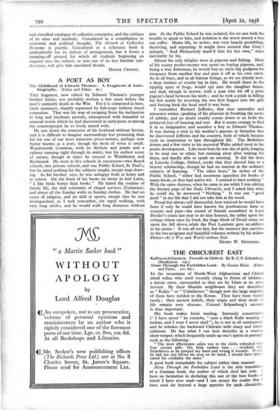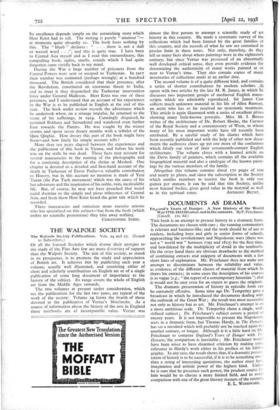THE OBSCUREST EAST
Kafirs and Glaciers. Travels in Chitral. By R. C. F. Schomberg. (Hopkinson. r5s.)
IN the mountains of North-West Afghanistan and Chitral dwell tribes who until recently clung to forms of idolatry ; a heroic error, surrounded as they are by Islam at its most fervent. By their Muslim neighbours they are described as " Kafirs " or " Unbelievers " though now the large majoriQ, of them have yielded to the Koran. They have been visited rarely ; their ancient beliefs, their origin and their mode of life remain very obscure. Colonel Schomberg's accoun' is thus important.
His book makes brisk reading. Intensely conservative (" I have never " he remarks, " seen a black Kafir wearing t' turban, and I trust I never shall"), he is not at all sentimental, and he rebukes the backward Chitralis with sharp and timely' criticism. He has what I can best describe as a rousing short temper, which frequently sends up one's spirits in passage• such as the following :
" The most affectionate adieu was to the chirbu refreshed witr four cascara pills. His little sunken eyes . . twinkled with friendliness as he grasped my hand and wrung it warmly. If on': he had not just blown his nose on his hand, I should have appre- ciated his cordiality the more."
A good book remarkable for subject rather than manner. Alone Through the Forbidden Land is the able translation of a German book, the author of which died last year. I have no hesitation in declaring this one of the best books of
travel I have ever read—and I can assure the reader that have read far beyond a large appetite for such chronicles.
Its excellence depends simply on the astonishing story which Herr Krist had to tell. The writing is purely " amateur "- at moments quite absurdly so. The book loses nothing by this. The " blurb " declares : " . . . there is not a dull or wasted word . . .", and this is quite true. I have been to Central Asia myself and as I read this extraordinary, this compelling book, sights, smells, sounds which I had quite forgotten came vividly back to my mind.
During the War a large number of prisoners from the Central Powers were sent or escaped to Turkestan. In 1917 their number was estimated (perhaps wrongly) at a hundred thousand. The British considered that their presence, after the Revolution, constituted an enormous threat to India, and to meet it they despatched the Turkestan intervention force under General Malleson. Herr Krist was one of these prisoners, and I understand that an account of his experiences in the War is to be published in English at the end of this year. The book under review records the adventures which he undertook when, on a strange impulse, he returned to the scene of his sufferings, in 1924. Cunningly disguised, he revisited Bokhara and Samarkand and wandered even farther East towards the Pamirs. He was caught by the winter storms and spent seven dreary months with a tribelet of the Qara Qirghiz. How dreary this part of the book might have been—and how finely his simple account tells !
More than ten years elapsed between the experiences and the publication of this book in Vienna, and before his work was on the stalls he was dead. These facts may account for several inaccuracies in the naming of the photographs and for a confusing description of the shrine at Meshed. One chapter is devoted to a detailed and first-hand account of the death in Turkestan' of Enver Pasha—a valuable contribution to History, but in this account no. mention is made of Yeni Turan (the Pan Turk movement) which was the cause of his last adventure and the inspiration of his noble, vain, incalculable life. But, of course, he may not have preached that weird racial doctrine to the simple and pious tribesmen of Central Asia, and from them Herr Krist heard the grim tale which he recorded.
These inaccuracies and omissions must exercise anyone who has specialised on this subject—but from the book (which makes no scientific pretentions) they take away nothing.
CHRISTOPHER SYKES.











































 Previous page
Previous page